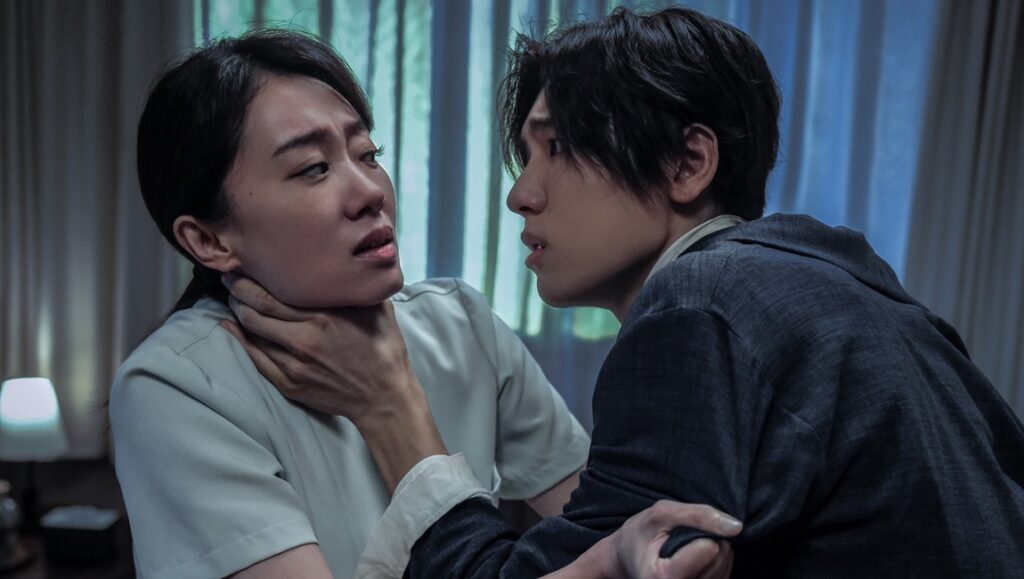After a shamelessly nepotistic career reboot last year with Snipers, a high-profile blockbuster directed with (and seemingly largely by) her father Zhang Yimou, Zhang Mo has returned to strike while the iron is hot with her first solo directorial feature since 2016’s by-the-numbers romantic comedy Suddenly Seventeen. Her latest, Last Suspect, is a female-led legal/crime thriller remake of forgotten ’00s Korean thriller Seven Days and stars Zhang Xiaofei, one of the emergent faces of the “30-something Chinese women” movement after her high-profile lead in saccharine tearjerker Hi Mom in 2021. Last Suspect follows hotshot 30-year-old lawyer and single mother Chen Zhiqi (Zhang Xiaofei) as her daughter is kidnapped during a school relay race, then used as leverage to force Chen to work on the case of a convicted murderer whose legal action is being retried in 5 days.
As is typical of the source material, the film twists and turns through consecutive dramatic whorls and nauseating gut punches. What is less typical of Korean thrillers of the ’00s is Last Suspect’s stunning lack of a coherent aesthetic. The visual design is filmic cliché after filmic cliché, where shots are just borrowed from other films with little rhyme or reason beyond immediate production practicality — Zhang Mo totally faceplants here at the very thing that her father is venerated for. In addition to failing to clear the basic hurdle of having an artistic vision present in her work of art, Zhang’s screenplay (supposedly rewritten dozens of times) is a total misfire. The conscientious framing of feminism and exploration of the depths of maternal love are paper-thin pretexts for rape scenes and gratuitous depictions of violence against women. Last Suspect boasts roughly the same level of sophistication and visual creativity behind it as any of the endless Chinese made-for-TV/direct-to-streaming exploitation films, except with an even more vapid narrative pastiche and a huge budget in service of disgustingly off-putting set pieces and filling in the background of each shot.
But there’s a deeper, gaping emptiness to Last Suspect that truly marks it as a poisonous film. In an interview, Zhang said her intention here was to show the flaws in human nature. And in some sense, Last Suspect achieves that. By the time this film ends, no character is unblemished, and behind every outwardly good character, we find the potential for corruption and evil. For a film that is framed in such stark de-ontological terms to implicitly suggest that all our core human impulses toward love will just be turned toward evil is truly sickening. The cumulative effect of watching this film is like staring at a painting and slowly realizing it is a hole in the wall, and then realizing that hole in the wall filled with dead bodies — pure nihilism. In fairness, it doesn’t seem that Zhang was thinking in these terms, or really thinking at all about what message might be emanating from her film. But in popular entertainment today, there is this powerful desire to subvert, to upend cultural norms. A lot of this originates with acts of subversion that justify themselves in moral terms, e.g. feminist revisions of classic patriarchal fairy tales. But this impulse has reached a juncture where artists and viewers alike need to take a step back and realize that we very much need fairy tales, need heroes to believe in that aren’t merely humans that resort to evil under the right (or wrong) conditions. Otherwise, we can only end up somewhere profoundly miserable and unfulfilling, like the film Last Suspect.
DIRECTOR: Zhang Mo; CAST: Zhang Xiaofei, Lee Hong-Chi, Kara Wai Ying-hung; DISTRIBUTOR: —; IN THEATERS: November 10; RUNTIME: 1 hr. 59 min.


Comments are closed.